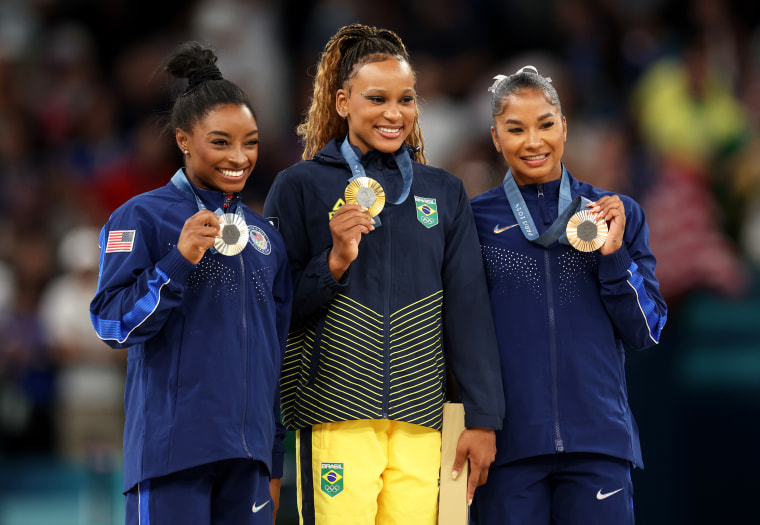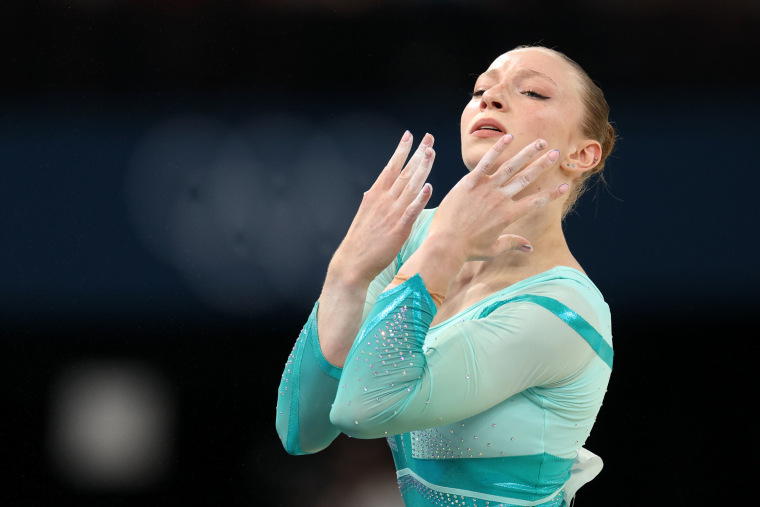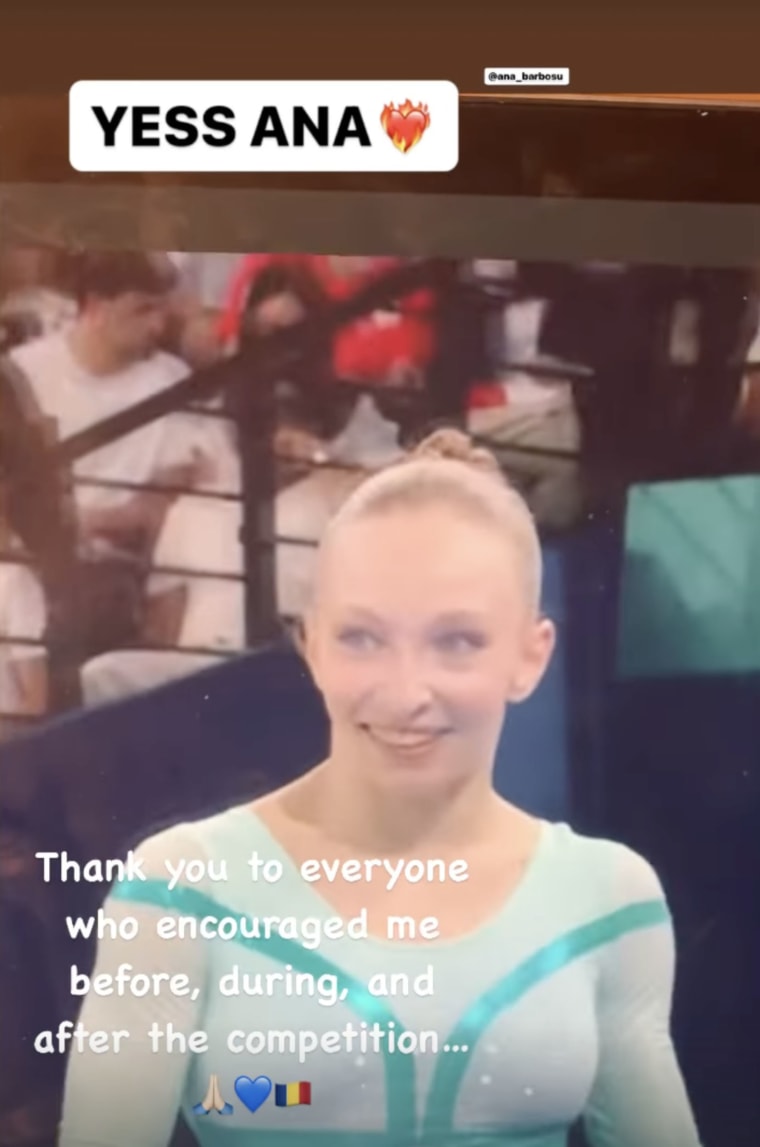What happened at the women’s gymnastics floor final? Inquiries, explained.
There was a problem providing access to protected content.(Error Code: 232403)
The Olympics women’s gymnastics floor final on Aug. 5 ended with an unexpected, and ultimately historic, turn of events.
Following an inquiry, U.S. gymnast Jordan Chiles was awarded the bronze medal, leading to the first all-Black podium in Olympic gymnastic history. Team Brazil’s Rebeca Andrade earned gold and Team USA’s Simone Biles won silver.
During a post-event interview with NBC Sports Zora Stephenson, Chiles, 23, spoke about the unexpected — yet emotional moment.
“This is just a dream come true. It’s my first time ever in an event final. Like we said, it was a redemption tour, and I just wanted to come out and do the best that I could,” Chiles said. “So this medal means everything. First event final, first event medal, like, oh my gosh! I’m very proud of myself.”
Chiles was originally awarded a score of 13.666 for her floor routine, which placed her at fifth. However, Team USA subsequently submitted an inquiry, which caused judges to increase her score to 13.766.

The change meant that Chiles won bronze, leapfrogging over 18-year-old Romanian gymnast Ana Bărbosu, who had a score of 13.700.
The upset elicited a range of emotions.
Recommended
Over on Team USA, shock and elation abounded. Upon seeing the score change, Chiles began jumping up and down next to gymnast Simone Biles. She then ran and collapsed onto the floor in tears, before sharing hugs with Biles and coach Cecile Landi.
Asked by Stephenson when she knew that she had a chance at the bronze, Chiles said, “They had told me what they did, and I was like, ‘OK, let’s see what they come back with,’ because you can go either way, go up or you go down.”
Adding that she was “the first one to see” the screen, “I was jumping up and down. They were like, ‘What happened?’ and then I showed them and it was just like, I honestly, didn’t expect this like whatsoever. I’m just so proud of myself.”
But the moment, which encapsulated the highs and lows of the Olympics, also was bittersweet.

Spectators empathized with Bărbosu, who began to celebrate when she initially thought she was placing third. When her fate changed, Bărbosu was seen crying. This would have been the country’s first gymnastics medal since 2012.
Gymnastics legend Nadia Comăneci, who competed for Romania, came down on the ruling.
“I can’t believe we play with athletes mental health and emotions like this… let’s protect them,” the nine-time Olympic medalist wrote on X, adding a #AnaBarbosu hashtag.
Viewers at home took on the range of emotions, with many feeling for Bărbosu in what was a “crushing” and “heartbreaking” moment, all while feeling “so so happy” for Chiles.
“Happy for Jordan Chiles, but man, that shot of the Romanian realizing she lost her place on the podium is heartbreaking,” someone wrote.
“The highs & lows of the Olympics…Romania’s Ana Bărbosu thought she had won the bronze, only to discover she had been bumped from the podium after a scoring change. Imagine your lifelong dream slipping away like this…Absolutely heartbreaking,” one person wrote, with the broken heart emoji.
Following the competition, both gymnasts shared posts on social media.
In an Instagram Story, Bărbosu shared a video from an account named @romanian.gymnastics and wrote, “Thank you to everyone who encouraged me before, during, and after the competition.” She added the prayer hands, blue heart and Romanian flag emoji.

In a separate Instagram post, Bărbosu also shared a series of shots of her Olympic performance, as well as images with her teammates in Paris.
“A dream come true,” she began her post, with the sparkle and teary-eyed emoji. “Competing with the most amazing teammates, and placing 7th at the Olympics is a huge accomplishment! Being in two individual finals was more than I dreamed of.”
Bărbosu then gave a positive spin to her floor upset, writing, “Going from 8th to 4th in the floor final was exciting!”
“None of this would’ve been possible without the people who were unconditionally supporting me. A big thank you to all of them!” she concluded the post with a blue heart emoji.
Chiles, on the other hand, shared a post on X, simply writing, “it’s funny how people can still never be happy for someone…”
Later in a post-event interview, Chiles added that she lost her voice, “Cheering for my teammates, cheering for myself.”
“I think, honestly, just being able to be a part of this team has just been so amazing. So losing my voice means everything, because it takes a while for me to do that,” she said. “I’m proud of each and every one of these girls, and especially myself.”
Why, exactly, was Chiles bumped up to third and Bărbosu to fourth? Here’s what happened.
What is an inquiry in gymnastics and how do they work?
An inquiry in gymnastics is a challenge to a gymnast’s score following his or her routine. The inquiry can only be submitted after the gymnast’s final score has been posted, but before the event ends.
In elite gymnastics scoring, athletes are awarded a difficulty score (D) and an execution score (E).
Any given routine has a D Score, starting at 0, based on the difficulty of the skills and connections performed. The E Score, which begins at 10, is determined by how well the skills and connections are performed in the routine. Errors during the routine cause deductions in the E Score.
A gymnast’s final score is the D Score combined with the E Score, subtracting penalties and neutral deductions, like stepping out of bounds.
An inquiry can only challenge the D Score.
A verbal inquiry must be made before the next gymnast begins his or her routine, or within a minute of the score being shown on the scoreboard, if the gymnast is the last in the event. A written inquiry must then be submitted within four minutes of the verbal inquiry.
The inquiry prompts review of the gymnast’s routine and can lead to raising or lowering the original score.
Why, exactly, did Jordan Chiles’ score change?
Chiles’ original final score was 13.666, with a 5.8 D score.
Based on the skills Chiles’ performed in her floor routine, Team USA coaches submitted an inquiry to lift her D Score 0.1 point.
The coaches told NBC that the skill called a Gogean, or a split leap with a 1.5-turn, was in Chiles’ routine but was not originally credited by judges.
Upon review, the judges agreed that Chiles hadn’t been awarded full credit on her leap and raised her score the 0.1 point to 13.766.






